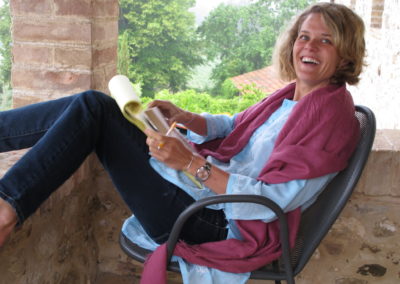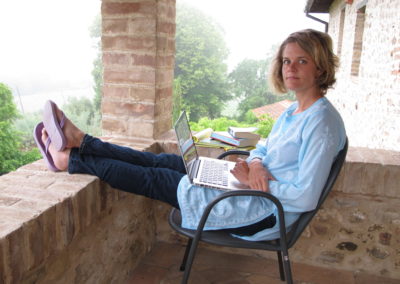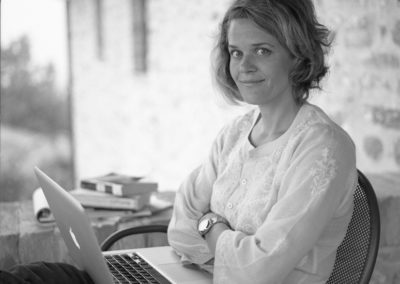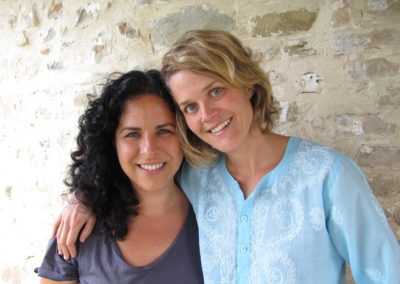Two paramedics, a man and a woman wearing green and blue scrubs, toss biscotti to seagulls. They glance out at the open ocean. Behind them, at the old port, their empty ambulance waits. A lone jogger, wearing a sweaty knee brace, runs around the parking lot. He, too, keeps his eyes on the Mediterranean Sea. Although he looks like a tourist, he’s probably a policeman.
The island of Lampedusa is overrun with law enforcement types and immigration agents. Along with relief workers and journalists, leery policemen fill the tourist hotels, restaurants, and beaches. The town is a town of well-muscled men, impeccably tanned. They aren’t my type, frankly. Clad in their tiny white spandex banana hangers, some even brought their girlfriends along on this phony business trip. Their job is supposed to be to police the thirty-seven thousand African refugees who’ve arrived on this island of five thousand. Later, that number will spike to fifty thousand. This massive diaspora is just one side effect of the Arab Spring; it’s also a business. To keep this refugee crisis under control—and to monitor who heads north—Italy collects money from the rest of the European Union. It’s a spectacular show when the open, wooden boats come in, people huddled against the gunwales. In this human drama, the police are the supporting actors. So are the journalists like me, struggling against the cordon to talk to arrivals. So are the paramedics. We are all waiting for refugees.
•
For thousands of years, Lampedusa has served as a garrison for empires—including, for a time during the 1980s, America’s. On this island, the Romans made garum, a rancid fish sauce. Third-century Christians left a cemetery here. Thanks to other old bones, it’s possible to trace the island’s passage between Christian and Muslim hands until the 1840s, when Tomasi di Lampedusa—ancestor to Giuseppe Tomasi di Lampedusa, who wrote The Leopard—sold the island to the Kingdom of Naples.
The island is politically Europe, but geographically Africa. This is the problem.
•
What am I doing here?
•
Reaching the island isn’t simple. I began this notebook in late June on a train traveling south from the Umbrian town of Perugia to Rome. From Rome I traveled to Sicily, and then on to Lampedusa. As a companion, I took along my friend and colleague, Eileen Ryan, who’s writing her dissertation at Columbia University on Libya. She lives between New York and Rome and speaks fluent Italian. My capacity for the language could be described as remedial restaurant, lots of grand gestures and foul-mouthed nouns to compensate for all I can’t say.
On the train, it strikes me that I’ve done a very stupid thing. I’ve left the castle and fifteenth-century farmhouse belonging to Civitella Ranieri, a tiny artists’ colony near the town of Gubbio, where my only job was to read the poet Propertius, or whoever I chose, and maybe to write some poems. Propertius was born in Assisi during the first century bce. He seems to have been a bit of a recluse. A poet’s poet, he was Elizabeth Bishop in a toga. And he didn’t seem to be constantly kissing imperial ass like some of his contemporaries. His humor allowed him to see himself. “Where are you rushing to, Propertius, wandering rashly, babbling on about Fate?” Clad in a bathrobe, I read this and waded into warm, morning dirt and to zucchini flowers off the vine for truffle frittatas.
So, what, I wonder, on this train to Rome, am I doing leaving that paradise for the coming chaos of refugees? I need a break from silence and a hit of the world. Also, it’s my responsibility. Having reported in Africa for more than a decade, it’s my job to pay attention when Africa washes up on the shores of Europe. So as the crisis struck, I sent a note to one of my magazine editors (not the editor of this one), asking if I could go cover the story. Also, I write better poems on the move and in odd landscapes. Being in unusual places allows me to feel that I have both an authority to speak and something to say. I can imagine myself as having a frank, fierce encounter with what’s real, even if this has nothing to do with the external world. It is easier to believe the poems are necessary.
Others before me have done the same double work, including James Fenton and Ryszard Kapuscinski, to name the two best. In both, a rage crops up in the poems that is fed by the reportage.
We talk about survivor’s guilt, but not about observer’s guilt. For journalists this is particularly acute, as we are paid to watch suffering and paid more during war. For poets, it’s even worse. It’s Adorno for the twenty-first century. The incomparable horror of Auschwitz has given way to Vietnam, Afghanistan, Iraq.
It is not what they built. It is what they knocked down.
It is not the houses. It is the spaces between the houses.
It is not the streets that exist. It is the streets that no longer exist.
It is not your memories which haunt you.
It is not what you have written down.
It is what you have forgotten, what you must forget.
What you must go on forgetting all your life.
And with any luck oblivion should discover a ritual.
From “A German Requiem,” by James Fenton
I wrote stone
I wrote house
I wrote town
I shattered the stone
I demolished the house
I obliterated the town
From “I Wrote Stone,” by Ryszard Kapuscinski
The Africans arriving from Libya aren’t Libyans. They’re citizens of Chad, Sudan, Somalia, Guinea, Ivory Coast, Nigeria, among other nations. Many are refugees who fled to Libya from their home countries. For years they’ve been trying to outrun Muammar el-Qaddafi, who, in turn, has been blocking their passage to Europe. Along with Libyan oil, Qaddafi’s horrific immigration prisons guaranteed him friends in Europe.
Two months after I visited Lampedusa, twenty-five Africans arrived dead in one boat. Five months later, a stunned Qaddafi was murdered by a Libyan mob.
At the time of my visit, however, such events were beyond imagining. Qaddafi was carrying out his threat to swamp Europe with Africans in a kind of human body warfare reminiscent of Fidel Castro’s 1980 Mariel Boatlift, when Castro allowed 124,000 Cubans to flee by boat and overwhelm south Florida. The Libyan ambassador in Italy, Hafez Qaddour, said that Qaddafi “wanted to turn Lampedusa black with Africans.”
It’s impossible to ask new arrivals questions about any of this—or about anything else. As soon as they arrive on, or even near, the island, Italian coast guard ships approach most of the vessels, load the refugees up by the hundreds, ship them into port and deliver them to shore, where they are numbered before being run through a waiting line of police, Red Cross, and other emergency workers, and boarded onto repurposed tourist buses. The buses take them to “centers,” which are immigration prisons, surrounded by barbed wire. Filo spinato sounds less punative in Italian. The refugees arriving from Libya spend between a few days and a few weeks on the island until their numbers swell to two thousand. At that point, they are loaded onto a ferry and taken to the island of Sicily and to the Italian mainland to yet another center, and another, until eventually, they are granted asylum and allowed to stay in Italy or travel north to other European countries.
The refugees arriving from Tunisia are a different case. Because their lives aren’t at risk if they’re returned to their country, Tunisians are regularly sent home against their will. This is one reason why they’re generally more unruly than the newly arrived sub-Saharan Africans: they have nothing to gain by being cooperative. Two years ago on Lampedusa, someone set fire to the Tunisian immigration prison. I hear different things about who started the blaze. First, it was lit by very pissed-off Tunisians. Second, it was lit by very pissed-off locals, who didn’t want their island, which survives on tourism, to become a safe haven for African refugees, especially Tunisians. Four months later, hundreds escaped from a center and marched around calling for freedom.
Prose from Poetry Magazine



